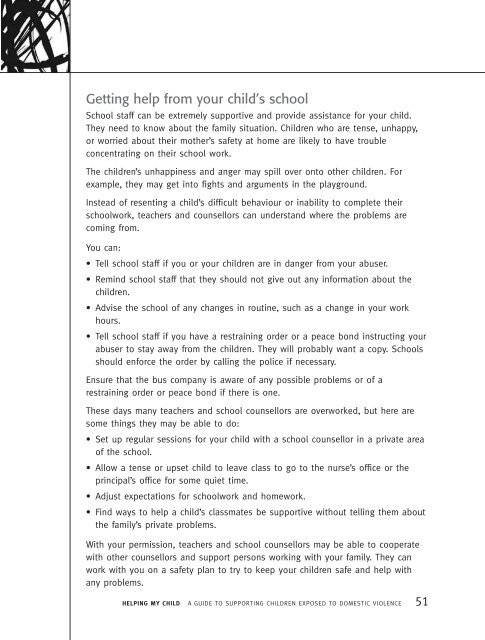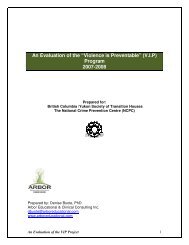a guide to supporting children exposed to domestic violence
a guide to supporting children exposed to domestic violence
a guide to supporting children exposed to domestic violence
Create successful ePaper yourself
Turn your PDF publications into a flip-book with our unique Google optimized e-Paper software.
Getting help from your child’s school<br />
School staff can be extremely supportive and provide assistance for your child.<br />
They need <strong>to</strong> know about the family situation. Children who are tense, unhappy,<br />
or worried about their mother’s safety at home are likely <strong>to</strong> have trouble<br />
concentrating on their school work.<br />
The <strong>children</strong>’s unhappiness and anger may spill over on<strong>to</strong> other <strong>children</strong>. For<br />
example, they may get in<strong>to</strong> fights and arguments in the playground.<br />
Instead of resenting a child’s difficult behaviour or inability <strong>to</strong> complete their<br />
schoolwork, teachers and counsellors can understand where the problems are<br />
coming from.<br />
You can:<br />
• Tell school staff if you or your <strong>children</strong> are in danger from your abuser.<br />
• Remind school staff that they should not give out any information about the<br />
<strong>children</strong>.<br />
• Advise the school of any changes in routine, such as a change in your work<br />
hours.<br />
• Tell school staff if you have a restraining order or a peace bond instructing your<br />
abuser <strong>to</strong> stay away from the <strong>children</strong>. They will probably want a copy. Schools<br />
should enforce the order by calling the police if necessary.<br />
Ensure that the bus company is aware of any possible problems or of a<br />
restraining order or peace bond if there is one.<br />
These days many teachers and school counsellors are overworked, but here are<br />
some things they may be able <strong>to</strong> do:<br />
• Set up regular sessions for your child with a school counsellor in a private area<br />
of the school.<br />
• Allow a tense or upset child <strong>to</strong> leave class <strong>to</strong> go <strong>to</strong> the nurse’s office or the<br />
principal’s office for some quiet time.<br />
• Adjust expectations for schoolwork and homework.<br />
• Find ways <strong>to</strong> help a child’s classmates be supportive without telling them about<br />
the family’s private problems.<br />
With your permission, teachers and school counsellors may be able <strong>to</strong> cooperate<br />
with other counsellors and support persons working with your family. They can<br />
work with you on a safety plan <strong>to</strong> try <strong>to</strong> keep your <strong>children</strong> safe and help with<br />
any problems.<br />
HELPING MY CHILD A GUIDE TO SUPPORTING CHILDREN EXPOSED TO DOMESTIC VIOLENCE 51






